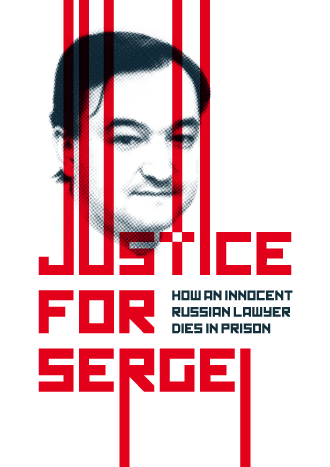


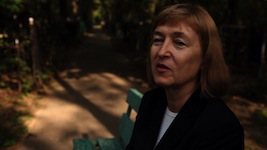
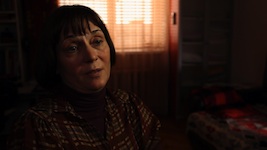
![]() Tatyana Rudenko is the aunt of Sergei Magnitsky. At age seventeen, she took care of young Sergei while his mother was still in college. “I think he had this naive belief that if you are right and if there is law, these laws should protect him. So I think he put his faith in those laws. He always acted according to the law.”
Tatyana Rudenko is the aunt of Sergei Magnitsky. At age seventeen, she took care of young Sergei while his mother was still in college. “I think he had this naive belief that if you are right and if there is law, these laws should protect him. So I think he put his faith in those laws. He always acted according to the law.”
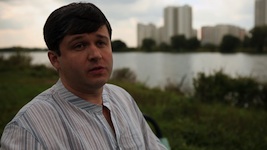
![]() Roman Mamayev has been a lifelong friend of Sergei. The two grew up together in the town of Nalchik in the Caucasus and have been friends ever since. Sergei grew up as ordinary boy. He could be naughty sometimes. And if it was necessary to fight, or to find out the truth somewhere in the school court-yard or in the playground, then he got up and either stood next to me or fought in the first line if something went wrong in his opinion. He was a real, a true friend. And when I knew Sergei was there to support me, I felt confident.
Roman Mamayev has been a lifelong friend of Sergei. The two grew up together in the town of Nalchik in the Caucasus and have been friends ever since. Sergei grew up as ordinary boy. He could be naughty sometimes. And if it was necessary to fight, or to find out the truth somewhere in the school court-yard or in the playground, then he got up and either stood next to me or fought in the first line if something went wrong in his opinion. He was a real, a true friend. And when I knew Sergei was there to support me, I felt confident.
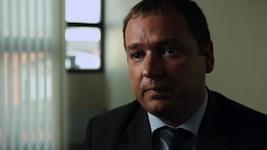
![]() Vladimir Yelin has known Sergei since the two of them met at the University in Moscow. After he graduated, Sergei asked his friend Vladimir to join him at the law firm Firestone Duncan. “The death of Sergei shows something is wrong. I think his death became an indication something is severely wrong in Russia. We must acknowledge this and do something to change it.”
Vladimir Yelin has known Sergei since the two of them met at the University in Moscow. After he graduated, Sergei asked his friend Vladimir to join him at the law firm Firestone Duncan. “The death of Sergei shows something is wrong. I think his death became an indication something is severely wrong in Russia. We must acknowledge this and do something to change it.”
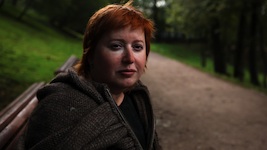
![]() The husband of Olga Romanova stayed in the same notorious Butyrka detention centre in Moscow as Sergei Magnitksy. The two of them got to know each other well. Through the stories of her husband, Mrs. Romanova obtained a first hand account of how Sergei was coping with life behind bars “Sergei was very patient and handled emotions as only few people can. What my husband told me about Sergei was that in the most difficult moments Sergei would just go to the wall and face it as if he wanted to withdraw him and that wall. It was like he switched himself off.”
The husband of Olga Romanova stayed in the same notorious Butyrka detention centre in Moscow as Sergei Magnitksy. The two of them got to know each other well. Through the stories of her husband, Mrs. Romanova obtained a first hand account of how Sergei was coping with life behind bars “Sergei was very patient and handled emotions as only few people can. What my husband told me about Sergei was that in the most difficult moments Sergei would just go to the wall and face it as if he wanted to withdraw him and that wall. It was like he switched himself off.”
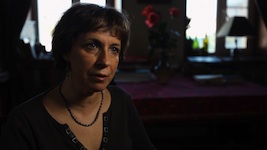
![]() Zoya Svetova works as a journalist for the Moscow New Times and she is a member of the detention watchdog POC. Four days after Sergei’s death in detention, the committee started an investigation. Mrs. Svetova talked to officials at the detention centre where Sergei was kept and is very clear about the relation between Sergei’s death and the fraud he uncovered. “If we presume that he was killed or made to die, so to speak, then surely there is a direct connection with that absolutely incredible theft of a huge amount of government money, of which employees of the Interior Ministry are being suspected. Of course there must be a connection.
Zoya Svetova works as a journalist for the Moscow New Times and she is a member of the detention watchdog POC. Four days after Sergei’s death in detention, the committee started an investigation. Mrs. Svetova talked to officials at the detention centre where Sergei was kept and is very clear about the relation between Sergei’s death and the fraud he uncovered. “If we presume that he was killed or made to die, so to speak, then surely there is a direct connection with that absolutely incredible theft of a huge amount of government money, of which employees of the Interior Ministry are being suspected. Of course there must be a connection.
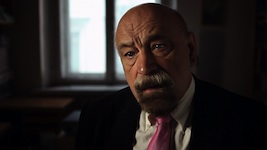
![]() Valery Borschev is chairman of the detention centre watchdog POC and investigated Sergei’s time in detention. Talking about Magnitsky’s refusal to go for a deal with investigator Silchenko, he says: “Magnitsky turned to be different. He did not go for a deal with the System; he did not go for an agreement. You know, Solzhenitsyn wrote many years ago the main principle of a prisoner: don’t trust, don’t be afraid, and don’t beg. So, Magnitsky lived according to what Solzhenitsyn used to write: don’t trust, don’t be scared, and don’t ask. And I think he is a hero.”
Valery Borschev is chairman of the detention centre watchdog POC and investigated Sergei’s time in detention. Talking about Magnitsky’s refusal to go for a deal with investigator Silchenko, he says: “Magnitsky turned to be different. He did not go for a deal with the System; he did not go for an agreement. You know, Solzhenitsyn wrote many years ago the main principle of a prisoner: don’t trust, don’t be afraid, and don’t beg. So, Magnitsky lived according to what Solzhenitsyn used to write: don’t trust, don’t be scared, and don’t ask. And I think he is a hero.”
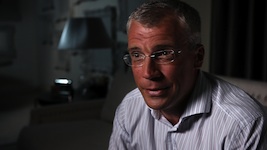
![]() Ivan Cherkasov is working for Hermitage Capital Management. Talking about Sergei’s investigation into the fraud, he says: “For Sergei, when he understood, that it was not Hermitage money that had been stolen, it was the money of his pensioning mother, from his kids, from him as a tax payer as well. Then it became his war.”
Ivan Cherkasov is working for Hermitage Capital Management. Talking about Sergei’s investigation into the fraud, he says: “For Sergei, when he understood, that it was not Hermitage money that had been stolen, it was the money of his pensioning mother, from his kids, from him as a tax payer as well. Then it became his war.”
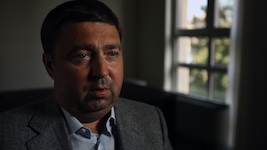
![]() Dmitry Kharitonov is the lawyer who represented Sergei while he was incarcerated and who visited him several times per week. “When talking to the investigator we used to ask: why are you keeping him in prison? He is not a criminal. This is not about a violent crime, he had no intention of fleeing and he would not and so on. Let him go. Every time they said to us: let him expose somebody. When I said to Sergei:, they say you have to expose somebody, he said: I am ready to expose those who have stolen the money.
Dmitry Kharitonov is the lawyer who represented Sergei while he was incarcerated and who visited him several times per week. “When talking to the investigator we used to ask: why are you keeping him in prison? He is not a criminal. This is not about a violent crime, he had no intention of fleeing and he would not and so on. Let him go. Every time they said to us: let him expose somebody. When I said to Sergei:, they say you have to expose somebody, he said: I am ready to expose those who have stolen the money.
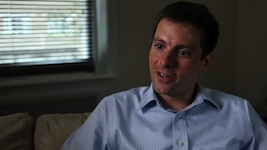
![]() Jamison Firestone is the owner of Firestone Duncan, the law firm where Sergei Magnitsky worked. He has know Sergei for over 15 years. Talking about the day he heard his friend had died, he says: “First there was a shock of disbelieve. I mean, it never crossed my mind in a million years that he would die. Yeah, it’s one of those… it changes your life immediately.”
Jamison Firestone is the owner of Firestone Duncan, the law firm where Sergei Magnitsky worked. He has know Sergei for over 15 years. Talking about the day he heard his friend had died, he says: “First there was a shock of disbelieve. I mean, it never crossed my mind in a million years that he would die. Yeah, it’s one of those… it changes your life immediately.”
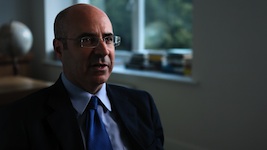
![]() William Browder is CEO of Hermitage Capital Management. He will never forget the day he heard the news about Sergei Magnitsky’s death. “This got from one nightmare to a worse nightmare, to a worse nightmare. And I mean it was just so horrible, an inconceivable, horrible thing.”
William Browder is CEO of Hermitage Capital Management. He will never forget the day he heard the news about Sergei Magnitsky’s death. “This got from one nightmare to a worse nightmare, to a worse nightmare. And I mean it was just so horrible, an inconceivable, horrible thing.”
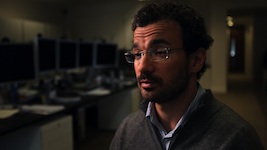
![]() Vadim Kleiner is head of research at Hermitage and worked closely with Sergei Magnitsky while he was investigating the fraud committed by government officials. “I think that for about two months, it was something, were you would go to bed and then would wake up in the midst of the night. Sometimes I had a dream that it was a kind of a nightmare. And that the other day everything would just clear up and I would call the Firestone Duncan office and would hear his voice as usual. And he would say: how can I help? But it is not.”
Vadim Kleiner is head of research at Hermitage and worked closely with Sergei Magnitsky while he was investigating the fraud committed by government officials. “I think that for about two months, it was something, were you would go to bed and then would wake up in the midst of the night. Sometimes I had a dream that it was a kind of a nightmare. And that the other day everything would just clear up and I would call the Firestone Duncan office and would hear his voice as usual. And he would say: how can I help? But it is not.”